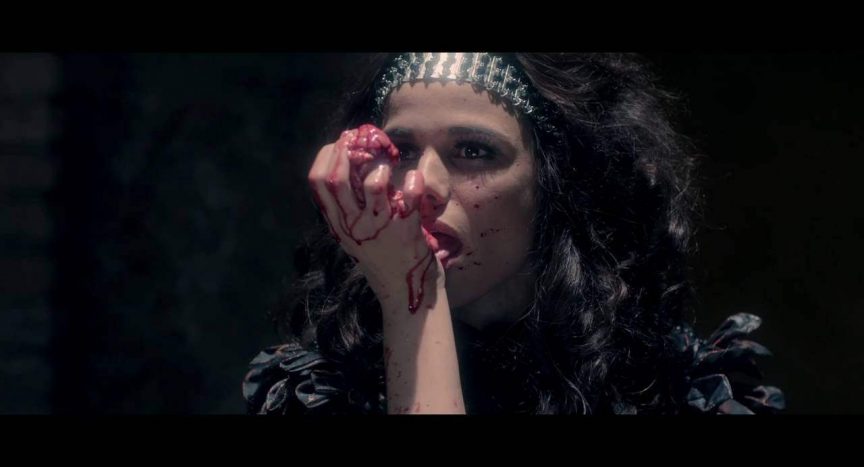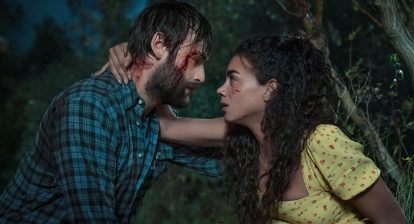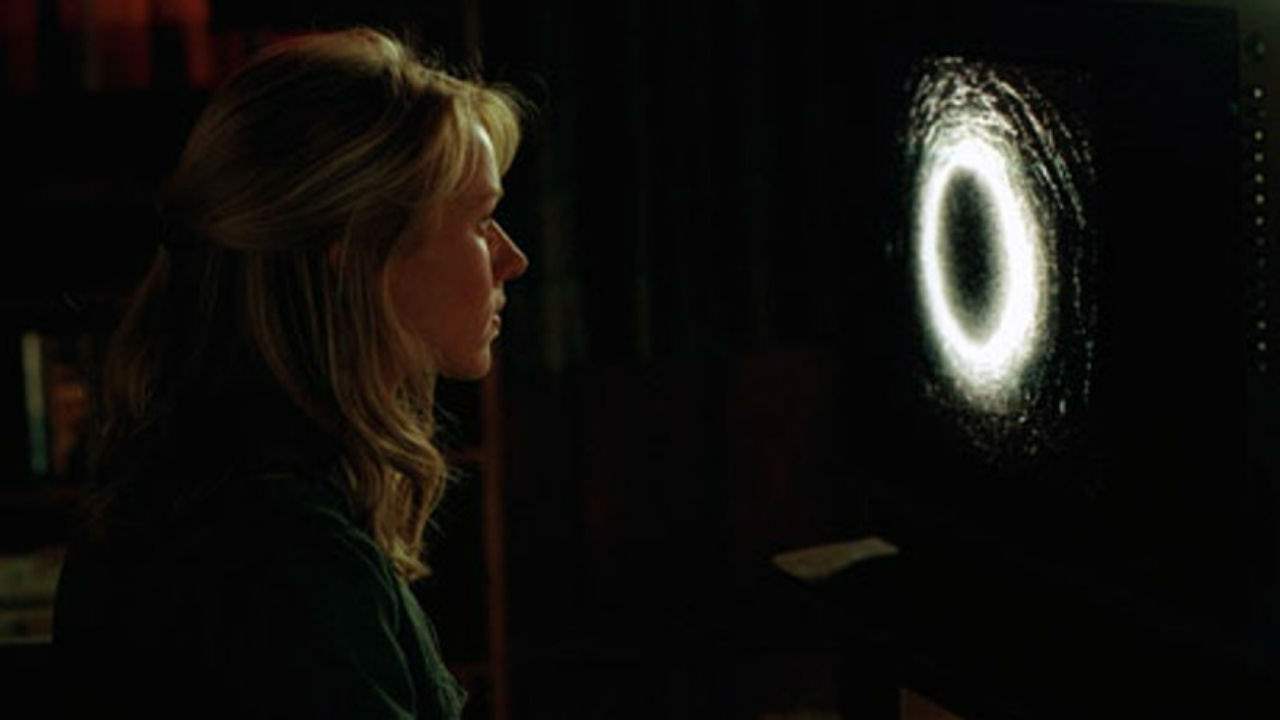Curse of Mesopotamia is an English language horror movie shot in the Middle East, and the first international horror movie shot in Kurdistan, Iraq. It tells the story of five individuals who have been having the same linked nightmare for years.
When their therapist realizes what’s happening, she unites them and schedules exposure therapy in the castle they’ve dreamed of. The patients discover that what they thought were dreams might be more real than they thought.
Actress, singer, and philanthropist Melissa Mars plays Amiri in the present day and Queen Lale in the past. Wicked Horror caught up with her over Skype to discuss the movie, the controversy surrounding it, the gore and lots more:
WH: In Curse of Mesopotamia, your character was involved in some pretty brutal scenes. Particularly one with a hammer. What was that experience like?
MM: Honestly, I enjoyed it. That was really fun. The scenes that are the most fun are honestly the bloody ones.
Plus the set was amazing. We were in this citadel that was from the ancient times. It was protected by UNESCO. Imagine that. Centuries of history there. This is the cradle of civilization. Just shooting out there, just being there and feeling the stones that have been there since the first civilization was so exciting. Beautiful.
Then I have this exciting scene. There’s this little cell that they built. The actress was really locked in and could only move her head just like in the scene. I had to be really careful to not hit her.
WH: So it was a real tool then?
MM: Yeah. I don’t know if it would smash a head open but it could really hurt someone.
WH: You also eat something pretty disgusting. What did that taste like?
MM: Oh my God. This was really funny. Lauand came to me and was like, “Don’t lick the blood, don’t lick the brains because it’s real brain.”
Basically, I was like, “Yeah. Okay.” I didn’t believe him. I thought it was fake, and I was in the scene and I was trying to lick my arm and lick the thing, because to me that was syrup or some mixture that was made or whatever. Lauand told me two times and I was like, “Yeah, yeah, yeah.” I was not supposed to lick or anything. I was so in the scene that I did it. And then the third take, because the king was going to eat it for real, the makeup artist changed it. He was like now it’s banana and maybe cranberry.
I was like, “What do you mean it’s banana now? What was it before?” He was like, “That was a sheep brain.” And I said, “What!? I didn’t know that.” Lauand said, “I tried to tell you. I tried to tell you not to do it.” But I was thinking that the makeup artist would do anything fake.
WH: What did it taste like?
MM: I don’t know. I don’t remember. When you’re in the scene you keep your brain from disgusting things. But people wanted to puke while they were watching us shoot the scene. I thought it was a fake prop and when I knew I was like, “Oh my God, you’ve got to be kidding me.”
WH: That’s really intense. Was there a plan for your character to have most of the gory scenes?
MM: [Laughs]. I didn’t see it that way. I think it was justified by the situation.
I love the scene in the bathtub. I really loved it. The rendering of it. I was inside the tub and I didn’t see what was going on or how it was filmed. When I watched the scene I’m really happy with the result. It’s really beautifully made. The set, again, was so mysterious. This bathtub in the middle of this big room.
While I was waiting to shoot I was just singing my song there and the sound guy caught it. He was like, “Oh my God. I recorded this. I hope you don’t mind. That would be awesome to use it on this scene” and I was like, “That’s a great idea.” I really loved it. And that place is really magical in that sense. That was just the natural reverberation of the room.
I was in—“dark state” I’ll call it—because we had so many takes with the demon. That scene was very tense and dark. I like to listen to music in between takes to not lose my focus and the makeup artist Helin Omar noticed that on the previous take that I was in the bath and I couldn’t get out and get my phone. I didn’t ask her but when she saw me in between everybody moving around me she brought my phone and asked, “What is the song you want to play?” She put the headset in my ears in between every take. Everybody was focused on their technical problems and I needed to stay focused so she brought my phone. That was an amazing thing to do. I’m very thankful for her.

WH: Are there specific songs you listen to, to stay focused? Do you listen to familiar music that you can drone out or new music?
MM: For every character I play, I build a playlist. You know, like we have playlists for our moods and our personality. When I build a character and I prepare a character beforehand, this is one of my favorite things to do. To have a playlist that is there and brings me back to the character every time I listen to it.
WH: Did you have two playlists for the separate characters played in Curse of Mesopotamia?
MM: No. That was one playlist, because even if there were two characters, they’re still one. They’re just in different periods of time.
WH: I understand that ISIS forced the movie on hiatus. What happened?
MM: ISIS came back in the news and they were trying to pass the boarder of Kurdistan and we were in Iraq. Then Obama made a speech about sending help. Since Erbil is the airport used for this kind of international help, Lauand [Omar]—the director of the movie—didn’t want us to get stuck there if they were using the airport for that.
And also, some people working on the movie wanted to go and fight too, which is heroic. So they had to leave. There was no way that a movie was going to be the thing to stop them.
WH: How was everyone told about the hiatus?
MM: I remember that it was in the morning. We were in the middle of a long scene on set location, shooting a day of the group therapy sessions. We had that meeting first thing. We were thinking that we were going to be told the schedule for the day. For our safety—not in that moment because there was no danger for us, but in the future—let’s finish the movie later. We’ll figure it out, but for now we’re going to go back home.
It was very shocking for us. We were like, “No. We want to finish the movie.” But Lauand was very smart.
WH: How long was the hiatus?
MM: It took him six months because he needed to find funds and a new a location. Sending us back on an emergency purchase of tickets, everything was more expensive.
But you know, sometimes the news creates a panic when there’s nothing really that should justify it. We didn’t sleep that night. We were all together because we were sad but at the same time we were excited. The end of something is the beginning of something else and we knew we would continue to shoot. There was this euphoric kind of feeling. We knew it wasn’t the last time that we would see each other. We were all spending the night together.
I flew back to Paris with another actress. Honestly, what shocked me that day was when we landed, the big titles on the newspaper were “Bombing.” They were saying that there were bombings in Erbil and we were in Erbil and there was no bombing that we witnessed or heard. There were terrible things happening in Iraq, but the fact that they put it in a location where it wasn’t happening was misleading. We were there. We were not in danger. Why is this happening? Why are they reporting bombings where they aren’t happening when other cities are being bombed? Why aren’t they reporting that? It’s faulty information. Maybe it’s because it’s easier to report on a city that’s more well-known than a small village.
WH: After the hiatus, did everybody come back?
MM: Yeah. Lauand made it happen. He got all of our schedules and made it match. Then we finished in Jordan in March 2015. Some people had to come later and some had to come earlier. He made it so that we shot the common scenes when everybody was going to be there together.
WH: Do you have any other upcoming projects?
MM: There’s Texas Zombie Wars that’s coming out this Fall. It’s a trilogy and the trailer was just released a few days ago. This is a really exciting role and project too. I can’t wait to see it come together.
WH: What’s Texas Zombie Wars about?
MM: Texas has closed its borders because there’s an infection across the United States. The soldiers are fighting against that infection and the zombies and the infected that are trying to get to us. The soldiers are real veterans that are actors too.
That was an honor for me to meet and work with real veterans. People who have been in Delta Force, Navy Seals, soldier in all of the areas of the army. Most of them have been number ones and heroes. I look up to them, and I really, really admire them for what they did with their lives and they’re now becoming actors, utilizing their skills for the sake of the art.
Curse of Mesopotamia is available through iTunes now.






